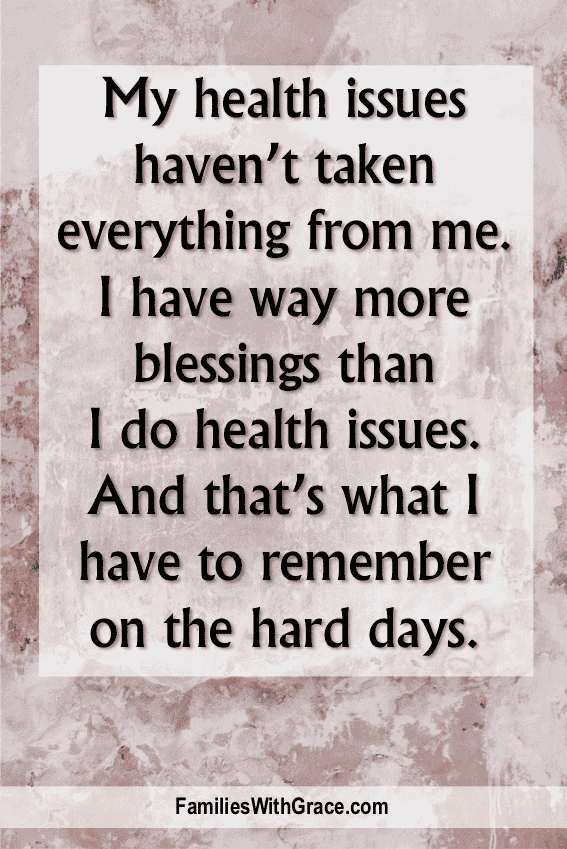My health journey has taught me many lessons
I was 3 when my bladder issues first started. Though they waxed and waned through different parts of my childhood, they came back with a vengeance when I was 23 and have stuck around ever since. A few years ago, they added their friend fibromyalgia into the mix.
I am a different patient today than I was 17 years ago. I’ve learned lesson after lesson throughout all the different journeys my health has taken me on.
1. I have to be my own advocate.

The two health issues I have, interstitial cystitis and fibromyalgia, aren’t always well known, even in the medical community. In fact, there are still doctors who don’t believe either condition exists. I learned early on that sometimes I have to push for what I need. I have to be the proverbial squeaky wheel to get some grease. At the end of the day, the receptionist, nurse or physician isn’t the one who is going home and living with the pain and issues that I have. As a quiet person, this was something that I struggled with in the beginning, especially because when I’m not feeling well or in pain I get even quieter. I have learned to speak up for myself, respectfully, and push to get the help I need.
Part of that also includes doing my own research. I have brought in research to my doctor before and asked to try different medications or treatments. I have found research for self-help strategies that really have made a difference in my pain, like figuring out all of my dietary triggers for IC. (I highly recommend Confident Choices for IC diet help!)
2. Doctors don’t know everything.
Doctors are in a position of authority. And they are usually smart folks who know more about health issues than the average person. But they don’t know everything. I have seen good doctors, great doctors and awful doctors. In being my own advocate, I learned that if a doctor didn’t have good enough answers for me that it was OK to move on to someone else. I have done so.
A couple of years ago, I was having increased pain in my pelvis. My local gynecologist determined the problem, but he was too afraid to help me because of my vast pelvic history. He sent me to a specialist an hour away. It was one of the worst doctor’s appointments I’ve ever been to — and that’s saying a lot. He insisted it was quite impossible for me to be feeling pain and if I was then I should just go to a pain clinic because I have chronic pain conditions. I knew something was wrong and needed fixed.
I reached out to a doctor I’d seen a couple of years before who is a leading IC expert for a recommendation. He suggested I see his colleague. It was a four-hour drive that was well worth it. He operated, and I’ve spent the last year and a half since feeling much better. I certainly have no regrets for getting an additional opinion.
3. If you have an insurance coverage question, get the procedure code before calling.
Part of managing a chronic illness and advocating for yourself is dealing with health insurance. I have learned to call for major procedures and double-check my coverage, even when a doctor’s staff told me they had checked. The best way to get the most accurate coverage information is to get the procedure code from the doctor’s office. Once I didn’t do that and what I thought was going to be a $25 co-pay ended up being $500! Since then, I always ask the doctor’s office for the code when I need to call the insurance and check on my coverage. When in doubt, check it out!
4. Don’t rely on doctors to have your files or send them to other doctors.
Usually having a chronic illness means you are seeing a couple of different doctors. In addition to my general practitioner, I see some specialists. I have found it’s a good idea to get copies of my records when I really need another doctor to have them because the records don’t always end up where they are supposed to be, especially if it is a quick turnaround time.
This is especially important if you are seeing a doctor away from the city where you live. My most recent surgery was with the specialist that is four hours away from me. While I stayed up in the area a couple of days post-op, I made sure to have copies of my surgery notes with me when we left to drive back home in case I had a complication and needed to see a doctor locally.
5. Keep a list of medications and surgeries.
I have been through phases where my list of medications changed almost monthly. Keeping my list up to date is important so if I have another appointment or a medical emergency, I can list what I’m taking and how much. I keep it in a Word document on my computer that I update as needed.
I found that keeping a list of surgeries and their dates (and even doctors and location) is also helpful. Any time you go to a new doctor for any reason, you have to list all of that information, so having it handy in a document that you can update is just helpful. If you keep copies of your medical records (I do for my pelvic history since I’ve had a few surgeries, all by different doctors), you could easily print out your med and surgery list to keep with them. Then everything is in one handy location.
6. Other patients can be so helpful along the way.
I am not sure I can fully put into words what connecting with other patients has meant to me. I have made some very good friends this way. I have connected with people with whom my path would never have crossed otherwise, and I am thankful for that. When I was going through a rough time of dealing with my bladder issues as a 13-year-old, I didn’t know anyone else who had the same struggle. A decade later, the Internet was around, and I found a patient group online that was eye-opening to me. Things I thought were just different about me turned out to be common in other IC patients. The IC Network has an incredibly helpful and moderated patient forum. That forum has given me so much encouragement and self-help ideas for which I’m beyond grateful.
And all that said, you do have to be cautious in patient groups when it comes to medical advice. People who are dealing with pain are often grasping at anything to help them feel better but not all advice from other patients is good or even helpful. Definitely do your own research!
7. God is always faithful, even when He doesn’t heal you.
As a Christian, healing has come up for me. I have battled with it. I have wrestled with it. I have prayed for it. I have had others pray for it. Once I went into remission, which I took as an answer to prayer for healing. I was shaken when my symptoms came screaming back into my life a few years later as a young woman.
While this really, truly could be a whole other post and one day will be, I can tell you that I have found God to be faithful and good every single step of the way even when I didn’t understand why I hurt. He has been faithful to me even though I am not healed. I can tell you that after I wrestled with this for a few years, I felt God telling me that I will be healed in heaven. And then I began to pray for healing from my need to be healed. God was faithful to help me with that need.
I would love to be healed — don’t get me wrong — but it doesn’t define me or run obsessively through my mind. I have learned that no matter how hard the mountain gets to climb that God is always there, carrying me up the mountain. He’s never left me on my own. There were times I put my hope in doctors and in treatments until the day God reminded me He is my only hope. So while I may wish that a treatment would work and try different things, I have learned that whether the treatment works or fails, God is always there and will be with me.
8. Don’t be angry with people who don’t understand.
No matter what your struggle is in life, it’s hard for people to understand it precisely because they haven’t lived it. I’ve had people try to be helpful and tell me about the latest treatment idea they’ve come across. Not once has that actually been helpful. In fact, usually the very suggestions being made would actually make me feel worse instead of better. I have learned to instead just change the topic.
The fact of the matter is, most people aren’t going to understand your life and your struggles — no matter what kind of struggles you have. Even now in my life being open about my health struggles, my husband is the only person who comes closest to knowing what I really deal with on a daily basis. If you see me in person, chances are I won’t even tell you about my health struggles or daily battles I fight. So I really can’t get angry when someone doesn’t understand.
9. I am more than my health condition.
Living with a chronic health condition is a daily issue. There are no vacations or breaks. There is no escaping it. There may be good days or weeks. But it’s always there lurking. However, I am so much more than interstitial cystitis and fibromyalgia. I am a mom, a wife, a daughter, a journalist, a friend and more. I have more to talk about and think about than my health.
If I let it, my health issues can consume my thoughts. That’s not healthy in any way. When I feel myself slipping into that, I pray for help and I work to focus on what I have. Because my health issues haven’t taken everything from me. I have way more blessings than I do health issues. And that’s what I have to remember on the hard days.
10. I have to let other people be sick, too.
This sounds so silly. I know it does, but it’s something I’ve worked on. I still work on it a bit, to be honest with you. I hear people talking about an acute pain or sickness and I want to roll my eyes sometimes. I want to say, “Imagine living like that every day! Imagine if you felt like you had the flu, five pulled muscles and a UTI all at the same time every single day. Then talk to me about it!”
Fortunately, I bite my tongue. Because my suffering doesn’t make their suffering any less. They are still suffering. God has worked on me to help me become more sympathetic and empathetic. I can often spot someone in pain before anyone else. I know the signs of living like a “normal person” with pain. I can have compassion when someone is hurt because I know what pain feels like. I may have more of it, but I also know how debilitating and disheartening it can be to live with pain, whether acute or chronic. I know what I want people to say to me. The truth is, none of us wants to hear about anyone else’s difficulties when we are struggling. So I keep those to myself and offer encouragement and prayer instead.




